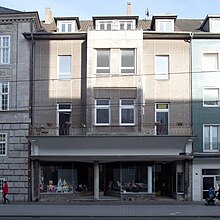Macroscope (Mülheim)
Coordinates: 51 ° 25 ′ 42.7 " N , 6 ° 52 ′ 45.5" E
The Makroscope - Center for Art and Technology is a cultural center in Mülheim an der Ruhr . It houses the museum for photocopying , rooms of the Shiny Toys Festival and the record label Ana Ott as well as studios and seminar rooms. A series of concerts for experimental music and sound art has been held in the house since 2013 . A large multifunctional room is used for changing exhibitions, lectures and film screenings.
Photocopy Museum
The collection on the technical history of the modern photocopy has been built up since 1985 as a volunteer museum work by typesetter and graduate designer Klaus Urbons . The collection contains rarities of old copiers that are ready for use and an archive with copy art from all over the world. Changing devices, documents and objects from the archive are presented in a permanent exhibition.
The exhibition uses various devices to show the technical development from analog copies to digital printing. In addition to various copier and fax machines, as well as the technical gadgets of a selfie printer, rare exhibits can also be found here. Including a Unikop flash copier developed around 1952 by the chemist Edith Weyde or a cabinet-sized luxury version of a Rank Xerox reproduction machine from 1953. At the same time, you learn a lot and bizarre things about the almost forgotten techniques of reproduction technology.
The Copy Art collection includes works by Franz John , Dore O. , Werner Nekes , Jürgen O. Olbrich , David Hockney and Robert Rauschenberg . Among many others, works by Joseph Beuys and Andy Warhol were shown in exhibitions.
Klaus Urbons calls his collection “Useum”. Workshops convey an interdisciplinary use of the old office equipment to create works of art, as an art object and part of an experimental light or sound art experiment.
In 2016 the first book of Edition Makroscope was published as part of the museum work: Edith Weyde - How an inventor from the Rhineland changed the world.
Exhibitions (selection)
- June 2014: "ERROR TEKK - analog video glitch patterns" by media artist Yochanan Rauert
- October 2014: “ El Lissitzky - Aspects of the Photographic Work” Lecture by Klaus Pollmeier
- December 2014: “Overlook” - RealScans by Peter Helmke
- February 2015: "inFormation" - works by Gabriele Klages
- March 2015: “OCD” - Copy-Art by Mario Santoro-Woith
- August 2015: "Electrophotography" - exhibition of the artists Tom Carpenter, Joel Swartz and Charles Arnold jr. from Rochester NY
- October 2015: "CORNUCOPIA" by Vittore Baroni
- November 2015: "Rainbow Poster" - by the Leipzig artist duo Rainbow (Falk Schwalbe, Hannes Hirche)
- April 2016: "Edith Weyde" - exhibition about the inventor of the "flash copy"
- December 2017: “Just push that button down” - exhibition about media art, fax art and global art fusion
Awards
- Klaus Urbons was awarded the Ruhr Prize for Art and Science of the City of Mülheim an der Ruhr in 2017 for his museum work.
Concert series for experimental music
Since 2013, concerts have been held in the Macroscope, mostly monthly. According to the self-image of the organizers, "the focus is on an experimental approach to sound and a critical look at cultural-industrial and pop-cultural contexts and conditions". Most of the guests are international bands and solo artists, including A Band of Buriers , Jan Klare , Datashock and Asmus Tietchens .
literature
- Book "Edith Weyde - How an inventor from the Rhineland changed the world", German / English, 2016, Edition Makroscope, Mülheim an der Ruhr, Ed. Klaus Urbons & Jan Ehlen , ISBN 978-3-00-054646-4 .
Others
The building in which the macroscope is located today has a checkered past. In 1933 the local NSDAP group moved into the former Hotel Terminus with their superior Karl Camphausen . The official name of the office at the town hall was Horst-Wessel-Haus . The people of Mülheim just called it "the brown house". After the war, the Prüßmann stationery department store opened here. The traditional company moved to Wallstrasse 5 in 2007. The building was later used by the NRW film office and the Mülheim climate initiative .




